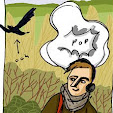Digital Wellbeing is a slippery concept, but a very useful one. I think. From the physical impact of increasing levels of sedentary and screen-moderated work to the psychological impact of the unbounded online task space we are in a zone now where digital wellbeing is a core self-care skill at every age.
Digital needs vary throughout lifespan, also. Right now, the pioneers of the ubiquitous online digital space and presence are starting to move into a life stage where they need to define the needs of older people online. This will need a move from a digital deficit model to one of digital enablement, sensory support and less of the constant upchurn of new irrelevant system learning.
At the other end of the agespan, children online need to move from a behavioural approach defined by fear of online risk to one which embraces online possibilities and asserts digital rights. Children (and teenagers, especially) need space to experiment, learn, construct identity and make mistakes. You don't get to that in a tediously constant risk environment.
For many adults the endlessly spawning nature of online digital administration has created online work, education and home administration spaces of dystopian intensity where tasks proliferate, endlessly and boundlessly. Not least among these task-spawning areas is wellbeing, where bots, apps, tasks, calendars, to-dos, alerts and more all cluster around the increasing task space of maintaining happiness and optimism in a complex modern world.
My digital wellbeing task list includes three social actions for each hundred comments read
I scan the comments section. People are talking about: peace of mind and safety; navigating wellbeing; reducing their use of digital activities to increase their wellbeing; information and relatable sources.
Five useful tips for getting the most out of your course
Interested to see the five useful tips essentially reduce to: self identify, interact, follow, bookmark, record and resist the urge to lurk. The same basic rules of interacting on forums.
The potential unfamiliar term here, lurking, is a concept that has been around since well before the online social space. Group-created magazines and resources such as APAs (amateur press associations) and Zines (amateur produced magazines) used the term RAEBNC (pronounced ray-b-nik or rayb-nich in conversation) to stand for "Read and Enjoyed but no Comment" for exactly that moment in time when you have completed viewing the information item but have nothing to add.
In physical space training (I train in both environments) there is a body language equivalent of RAEBNC - eye contact, a nod, a look, it varies student by student. The urge (expressed by some of my fellow trainers and most of my fellow managers) to have everyone "turn on their cameras" during sessions, meetings, etc. may come partly from that need to feel that the information you have shared has landed.
The Teams/Zoom/etc. thumbsup 👍 is sometimes seen used in this way during group learning or sessions, but feels comparatively vague and unreliable.
and.... where are you from?
Questions to start a conversation is a core part of online course building, of course. Why have you decided to join us on this course? is a classic up there with Well, what do you do?
Hm. I am procrastinating by doing this course. I actually need to be building an online course. But I don't want it to contribute the heavy exhausting online digital task burden we are all labouring under constantly at the moment. I want it underpinned by principles of digital wellbeing. So I'm starting by gathering ideas about how to do this.
That probably has covered most of my key learning aims for completing this course, although there is another; I am recovering from illness and building up my speed at both reading and writing. Ideally I ought to be doing this as an exercise, a bit a day. That has not really happened.
Final question is as ever: How will you use the information you get from this course? Well, the course is linked to my area of work, but this is coming from a very different angle from my usual work task space of social care's preoccupation with digital risk and safeguarding and online child protection.
This library and information studies approach of providing core information and enabling the individual to construct their own actions and solutions is very crucial in Early Help practice, and a space I hope to develop.




No comments:
Post a Comment